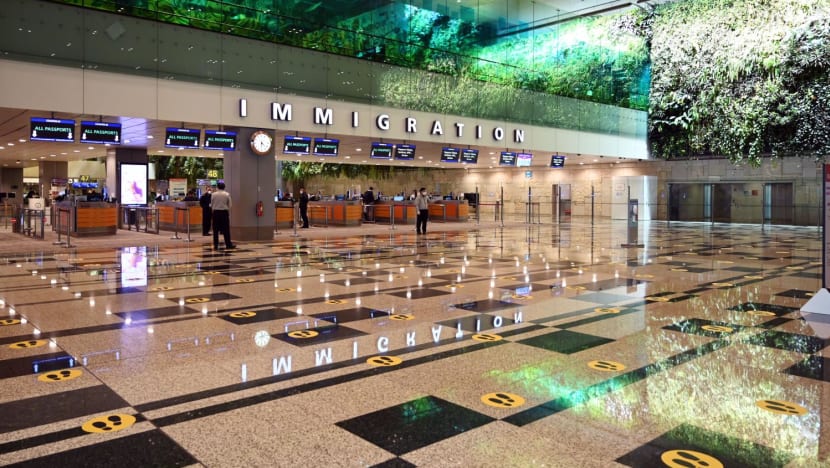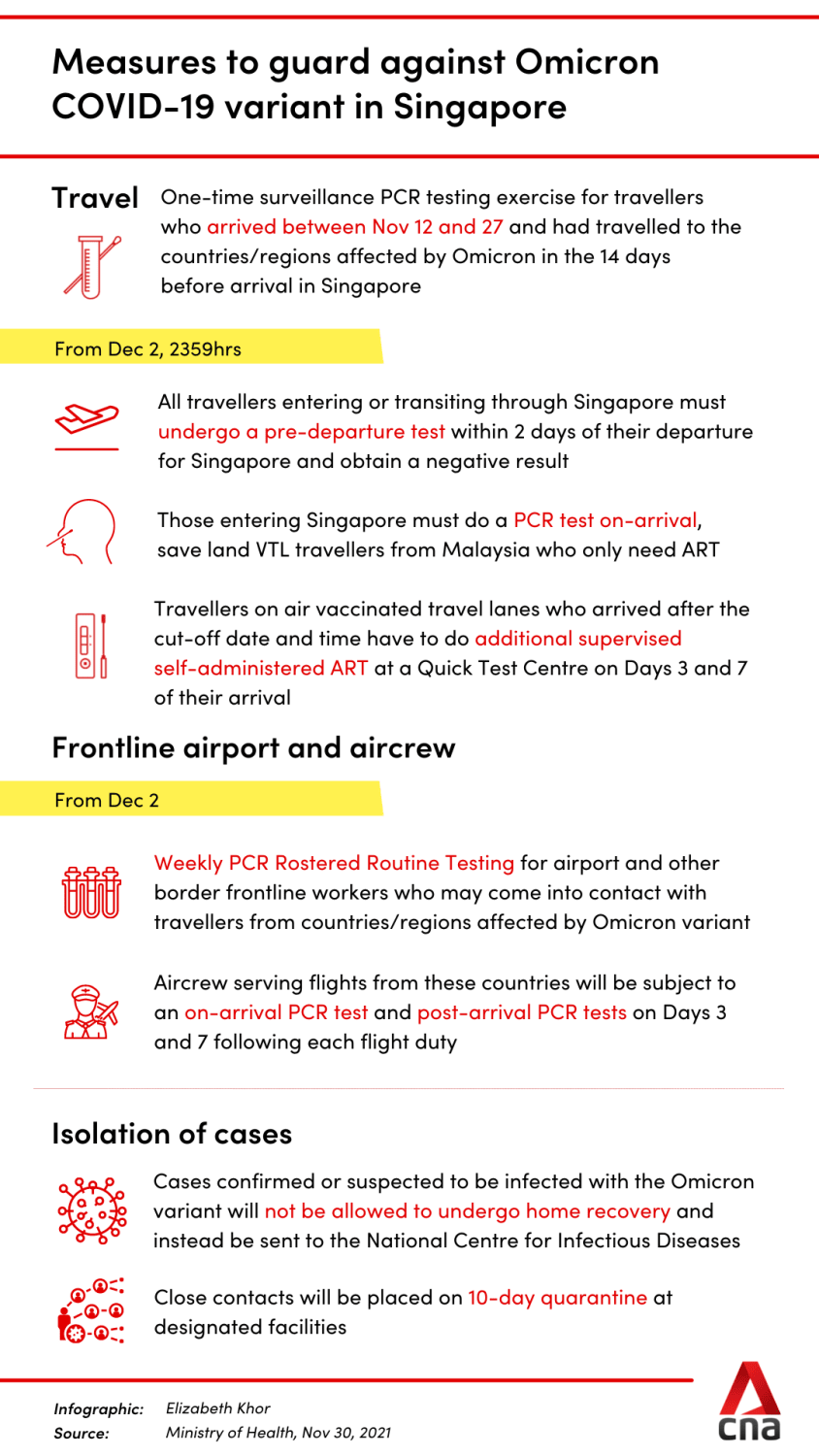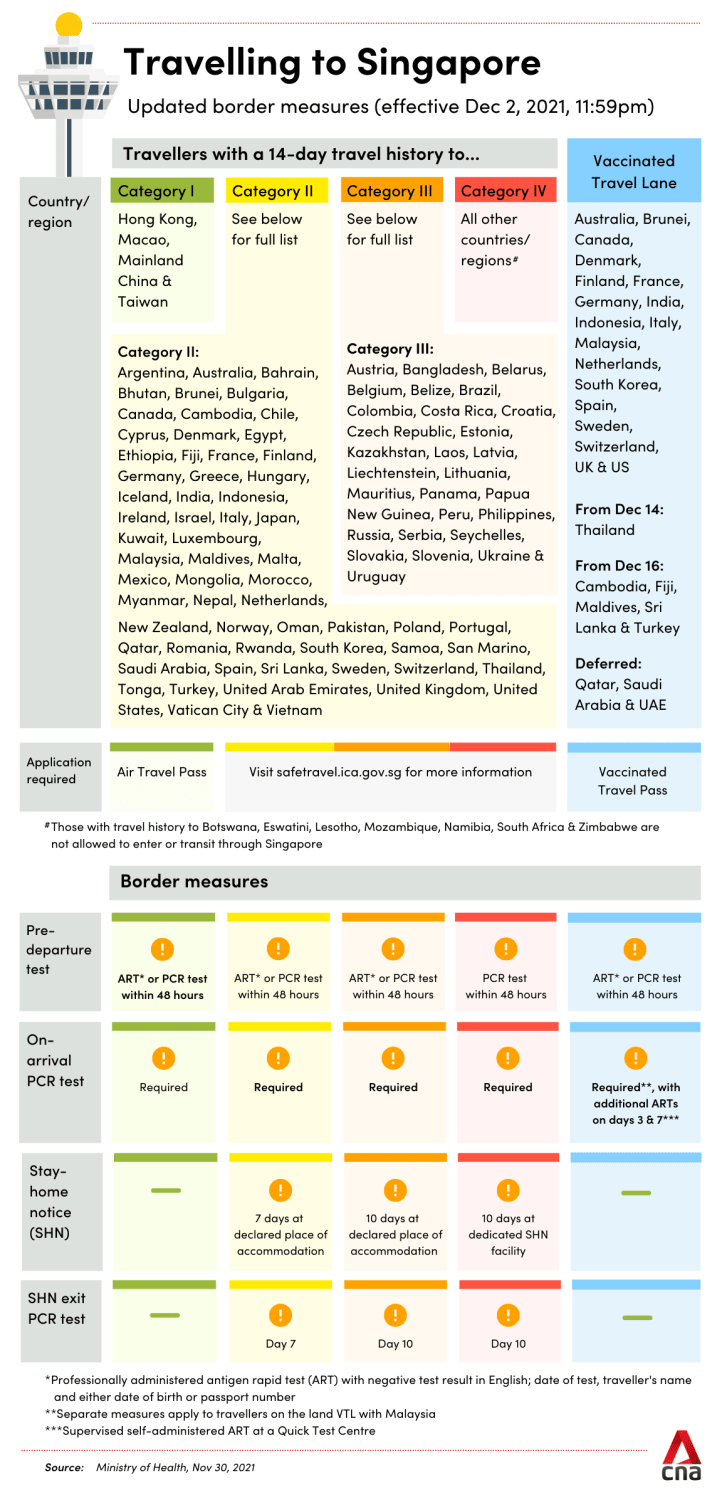Singapore to enhance COVID-19 testing protocols for all travellers as part of measures to deal with Omicron variant
Travellers on the vaccinated travel lane scheme who arrive in Singapore from Dec 3 must take additional antigen rapid tests to detect Omicron variant.

File photo of the immigration checkpoint at Changi Airport Terminal 3. (Photo: Marcus Mark Ramos)
SINGAPORE: Singapore will enhance its COVID-19 testing protocols for all travellers as part of tighter measures to deal with the Omicron variant.
Among the measures, travellers arriving in Singapore on the vaccinated travel lanes (VTL) from 11.59pm on Dec 2 must take additional antigen rapid tests (ART) to reduce the importation of the new Omicron coronavirus variant and allow prompt detection and isolation of cases who might have it.
These travellers must undergo supervised self-administered ARTs at a quick test centre on Days 3 and 7 of their arrival, the Ministry of Health (MOH) said in a news release on Tuesday (Nov 30).
Currently, VTL travellers only need to take an on-arrival polymerase chain reaction (PCR) test and self-isolate until they get a negative result.
This comes as some countries have shut borders or tightened restrictions on travellers to contain the Omicron variant, which could potentially be more dangerous than the current dominant Delta variant.
Health Minister Ong Ye Kung said on Tuesday that Singapore will freeze new VTL openings amid "major uncertainty" brought by the Omicron variant, although he acknowledged that cases with the variant could "sporadically" slip into the country as authorities continue to learn about it.
This includes whether the variant is more infectious or harmful than others, its incubation and infectious period, whether ART and other tests can detect it, and how well vaccines work against it, Mr Ong said at a COVID-19 multi-ministerial task force press conference.
"For domestic healthcare protocols, we can use the Thermo Fisher PCR to preliminary identify Omicron infections and differentiate the follow-up actions," Mr Ong added.
"But for border policies, there is no basis for us to do so. So, this is where we need to judge very carefully and be prepared to adjust our border measures along the way."

COVID-19 multi-ministerial task force co-chair Gan Kim Yong said the land VTL with Malaysia will not be subjected to the additional ART tests as it is currently restricted to citizens, permanent residents and long-term passholders of either country.
"With Malaysia, we have always taken a risk management approach," he said, pointing to how authorities implemented additional on-arrival ART tests for those entering Singapore on the land VTL once the potential threat of the Omicron variant became clear.
"So, there are various measures in place to mitigate the risk."
Travellers using the land VTL with Malaysia will still be subject to a pre-departure test and an on-arrival ART.
When asked how Singapore might decide on suspending VTLs, COVID-19 multi-ministerial task force co-chair Lawrence Wong said authorities will look at data concerning the spread of the Omicron variant in these countries.
"If we think that there is a very strong likelihood or we assess that there is a risk of imported infections coming through that particular channel, then indeed we will consider suspending the VTL with that country," he said.
When it comes to border measures, Mr Wong said Singapore can choose the drastic steps of leaving things unchanged, or shutting the borders and stopping travel altogether.
"Of course at this juncture, we should not under or overreact or rush to any of these extremes. In fact, there are many options in the middle of the spectrum," he added.
"We should judge the situation carefully and develop our responses based on data and signs, as we have been doing throughout this pandemic."
ADDITIONAL MEASURES
In further stepped up measures against the Omicron variant, travellers entering or transiting through Singapore from Dec 3, including travellers from Category I regions, must undergo a pre-departure test within two days of their departure for Singapore and produce a negative result.
Those entering Singapore, including travellers from Category II, III and IV countries, must also undergo a PCR test on arrival.
Currently, travellers from the Category I regions of Hong Kong, Macao, mainland China and Taiwan only need to take a PCR test on arrival, while those from Category II, III and IV regions only need to take a PCR test near the end of their stay-home notice period.
These enhanced measures will apply for four weeks in the first instance, and will be reviewed and extended if necessary, MOH said.
The ministry will also conduct a one-time surveillance PCR testing exercise for travellers who arrived between Nov 12 and Nov 27, and had travelled to the countries or regions affected by the Omicron variant in the 14 days before their arrival in Singapore.
These affected countries or regions are Botswana, Eswatini, Lesotho, Mozambique, Namibia, South Africa and Zimbabwe.
"These travellers have been notified of their scheduled test time and venue. We seek the understanding and cooperation of affected travellers for the testing exercise," MOH said.
MOH advised Singapore residents to defer all travel to higher risk countries or regions, including those affected by the Omicron variant, until further notice.
Travellers who visit places with reported cases of the Omicron variant or countries that see a lot of visitors from these places should take extra precaution, MOH said.
This includes wearing masks, and observing good personal hygiene and safe management measures even if these requirements are not required there.
"This will protect you during this period of uncertainty," MOH added.
BORDER MEASURES ALONE NOT ENOUGH
Mr Wong said Singapore knows from the past two years handling the pandemic that border measures alone cannot stop the Omicron variant from entering Singapore.
"Even the countries with the strictest of border regimes like China and New Zealand, for example, have experienced the Delta variants in their countries," he said.
"And so it will be for this new variant. The bottom line or the more important point is to recognise that border measures are really part of an overall system of defence."
The other measures include vaccinations and boosters, testing, as well as tracing and ringfencing every cluster that could be linked to the Omicron variant.
"All the basic measures around safe management that we have put in place – these remain vital," he added, highlighting how some countries in Europe have started to reinstate measures like wearing masks and social distancing.
"We have maintained these basic safe management measures throughout, and we should continue to maintain such a posture."
Editor’s note: This story has been updated after MOH amended its press release. The enhanced COVID-19 testing protocols will apply to all travellers entering or transiting in Singapore, not just air arrivals.

Watch the full news conference, including the Q&A session with journalists:
BOOKMARK THIS: Our comprehensive coverage of the COVID-19 pandemic and its developments
Download our app or subscribe to our Telegram channel for the latest updates on the coronavirus pandemic: https://cna.asia/telegram
















